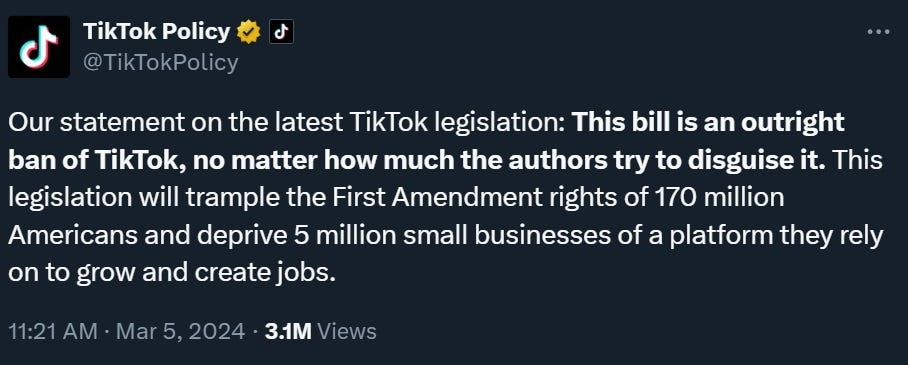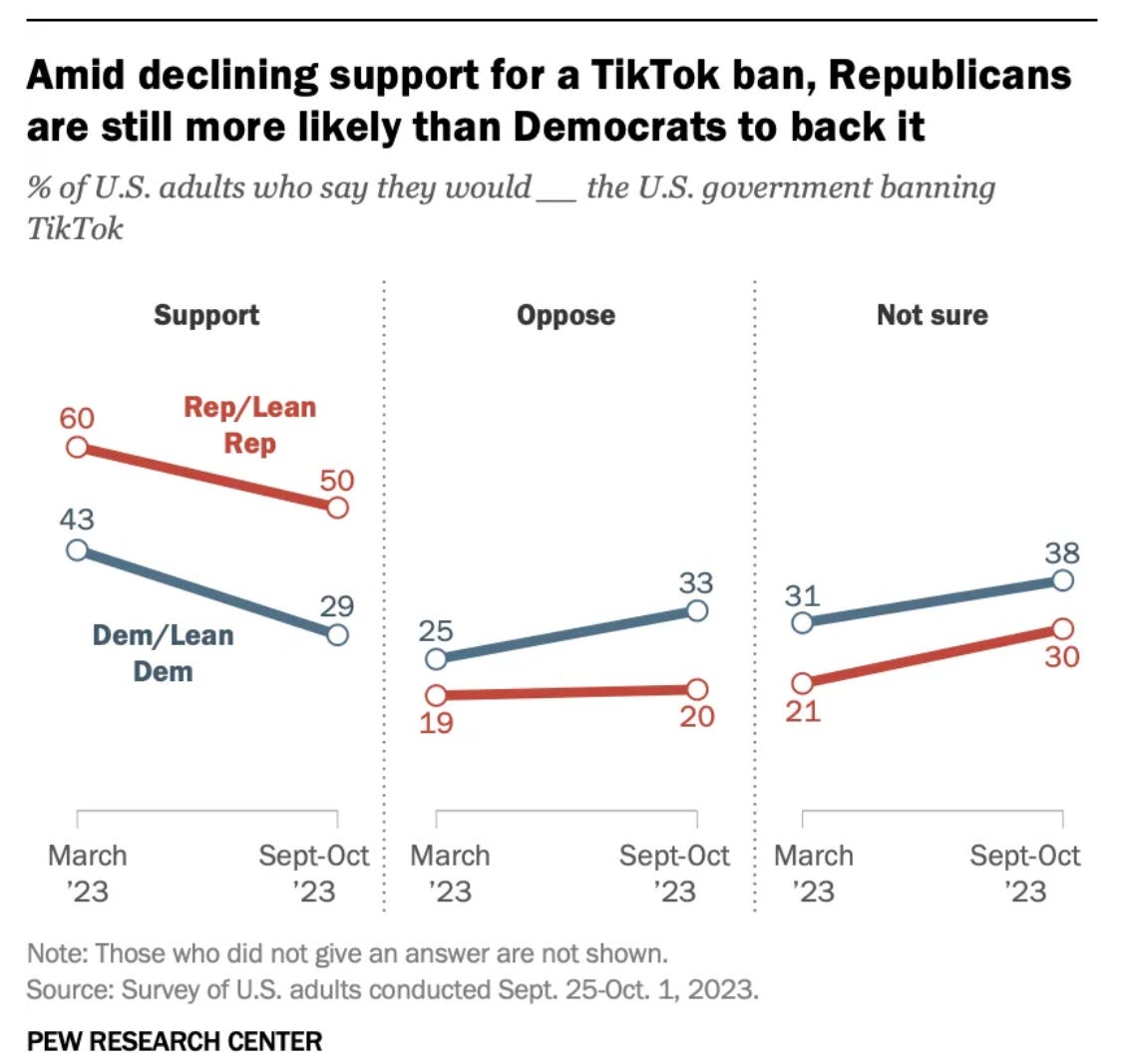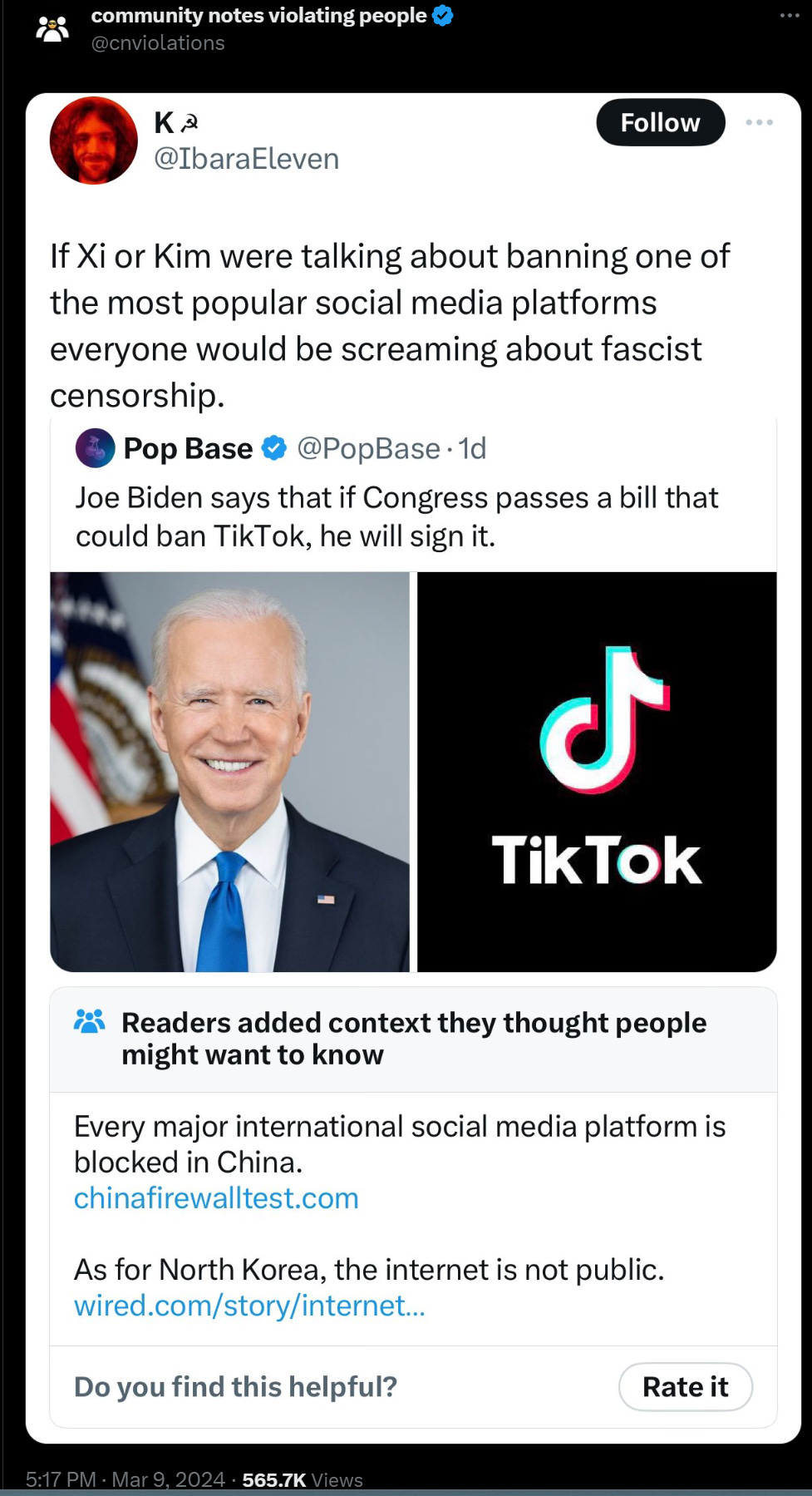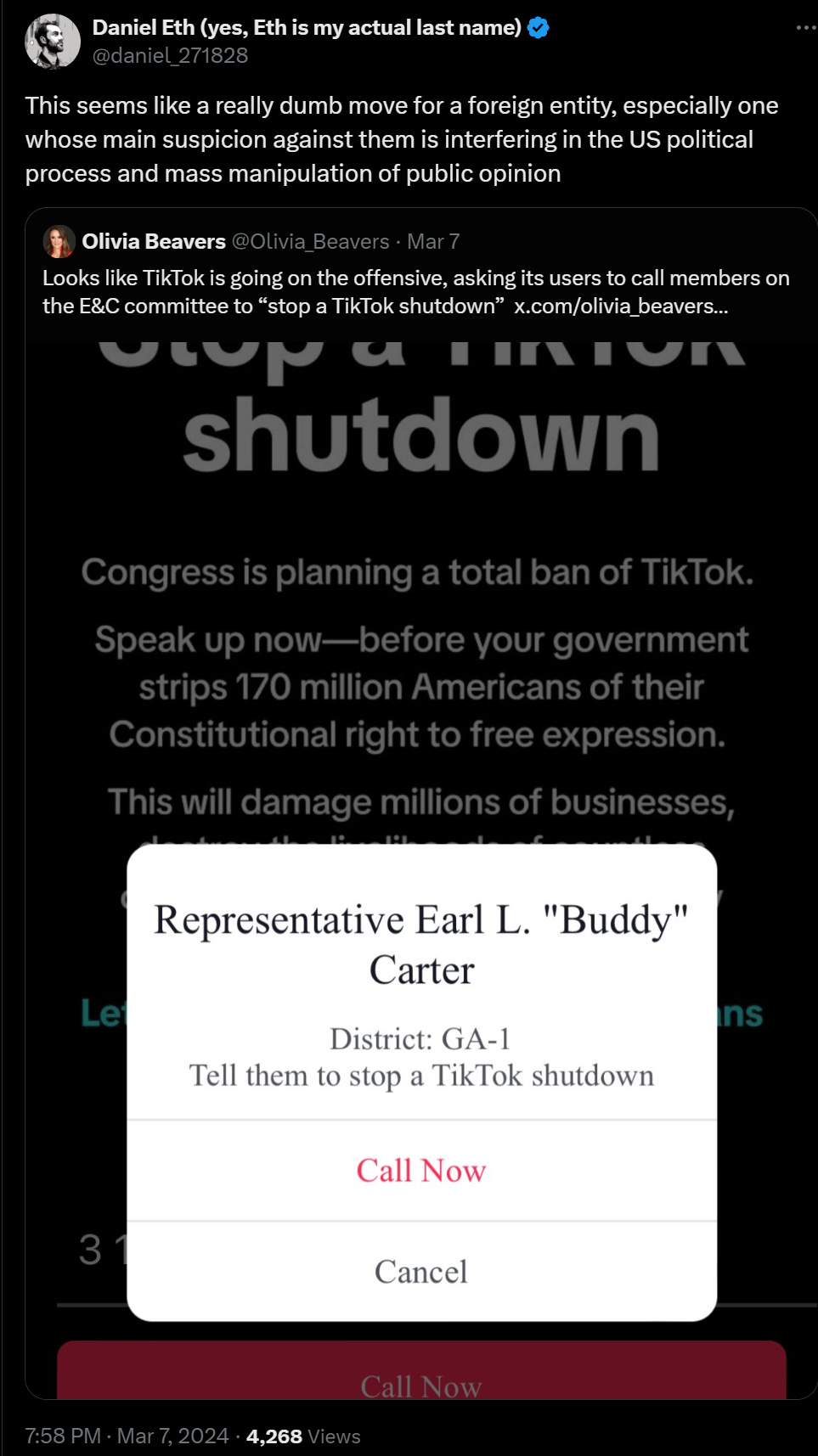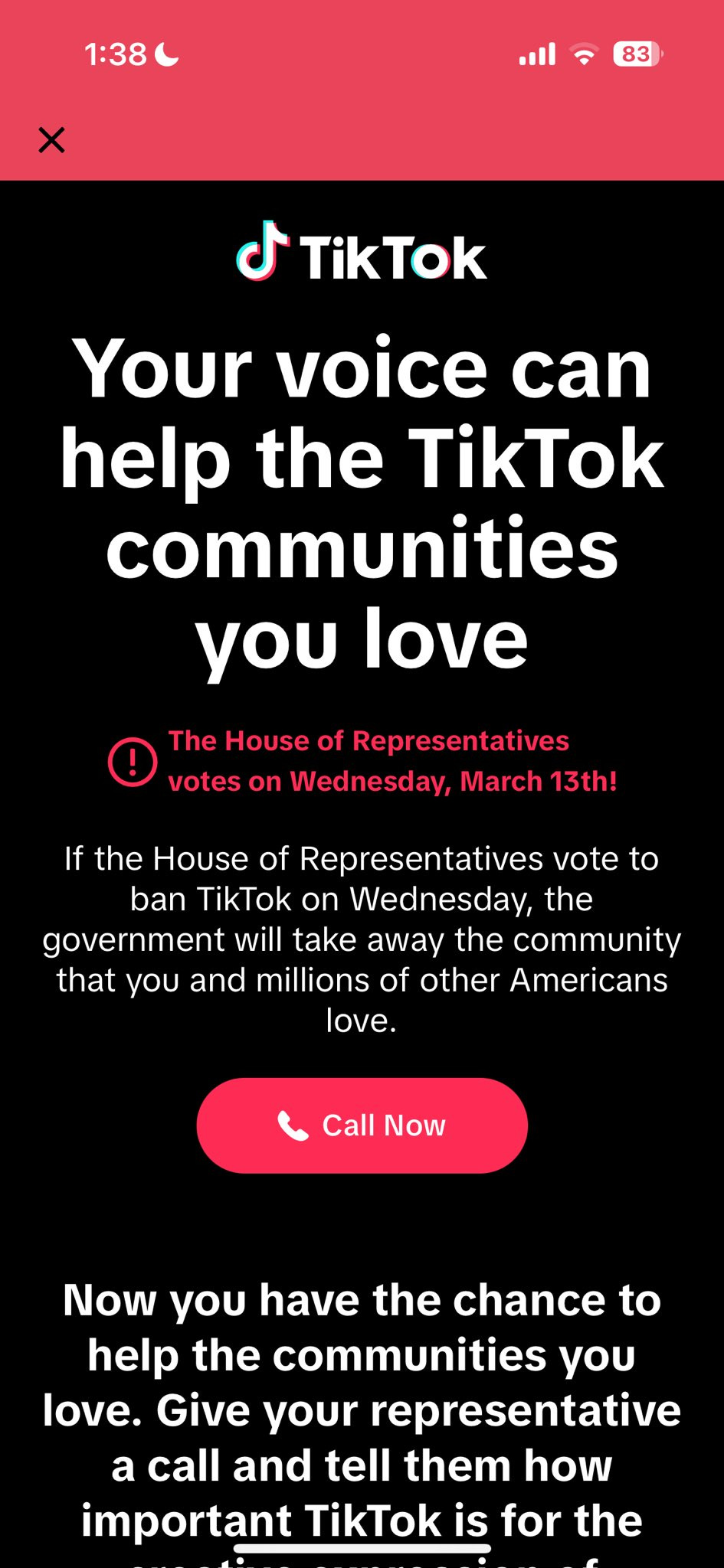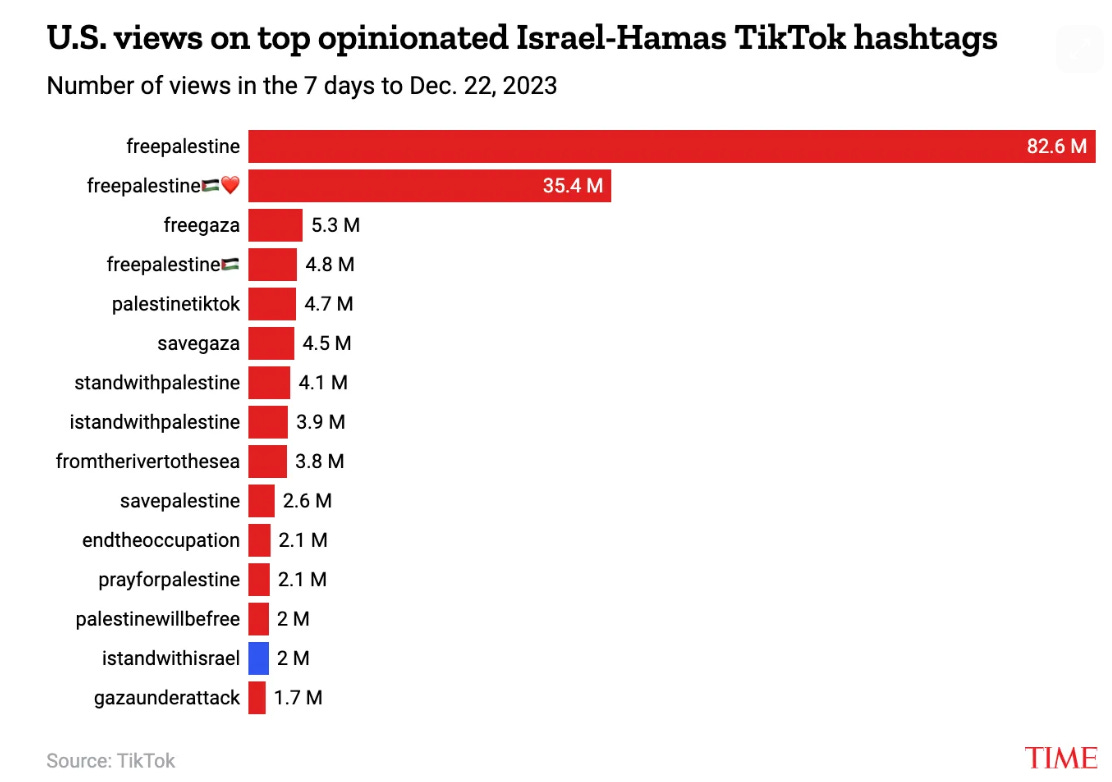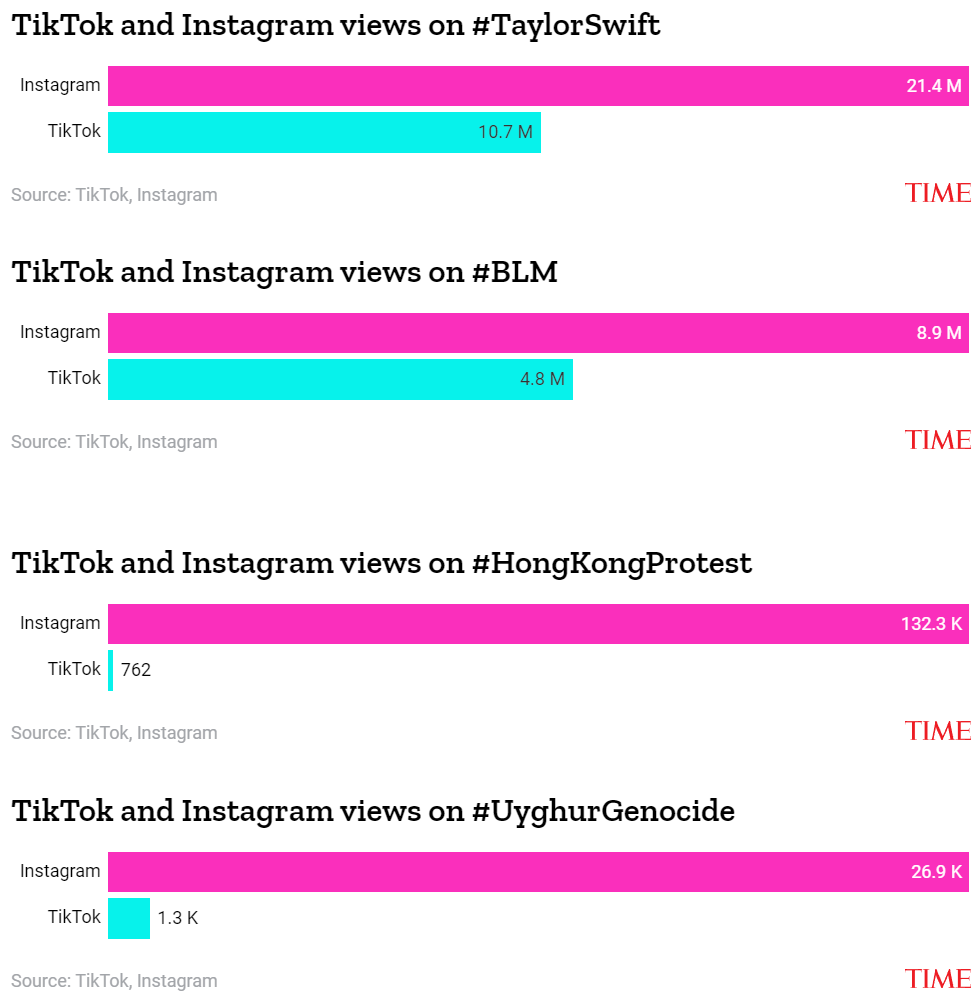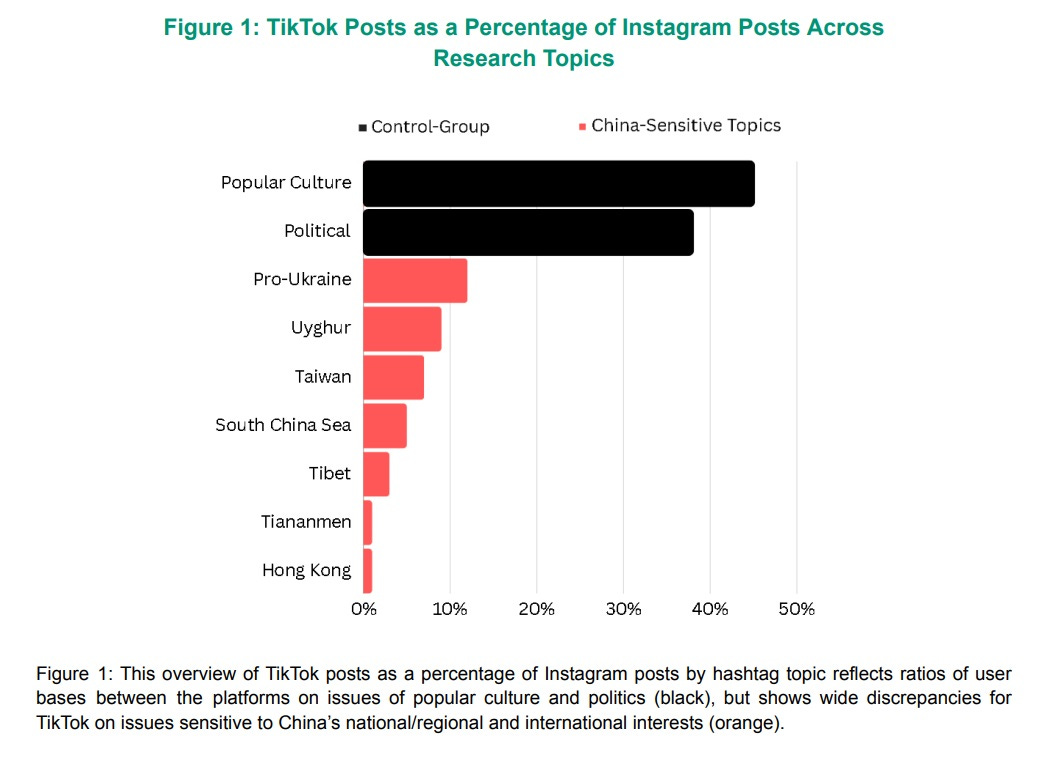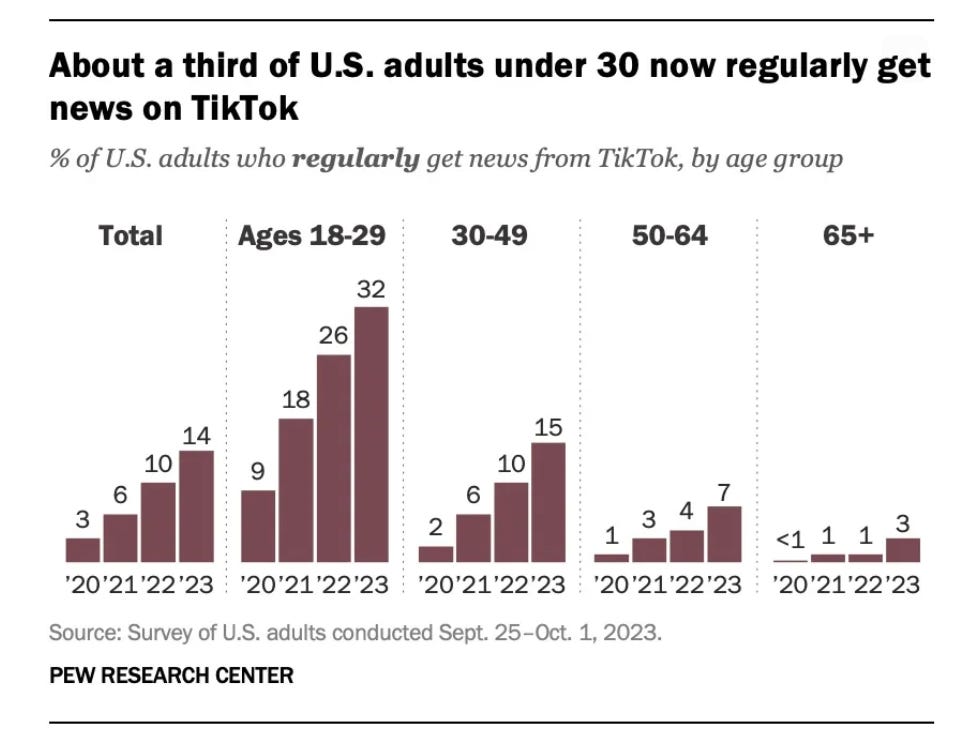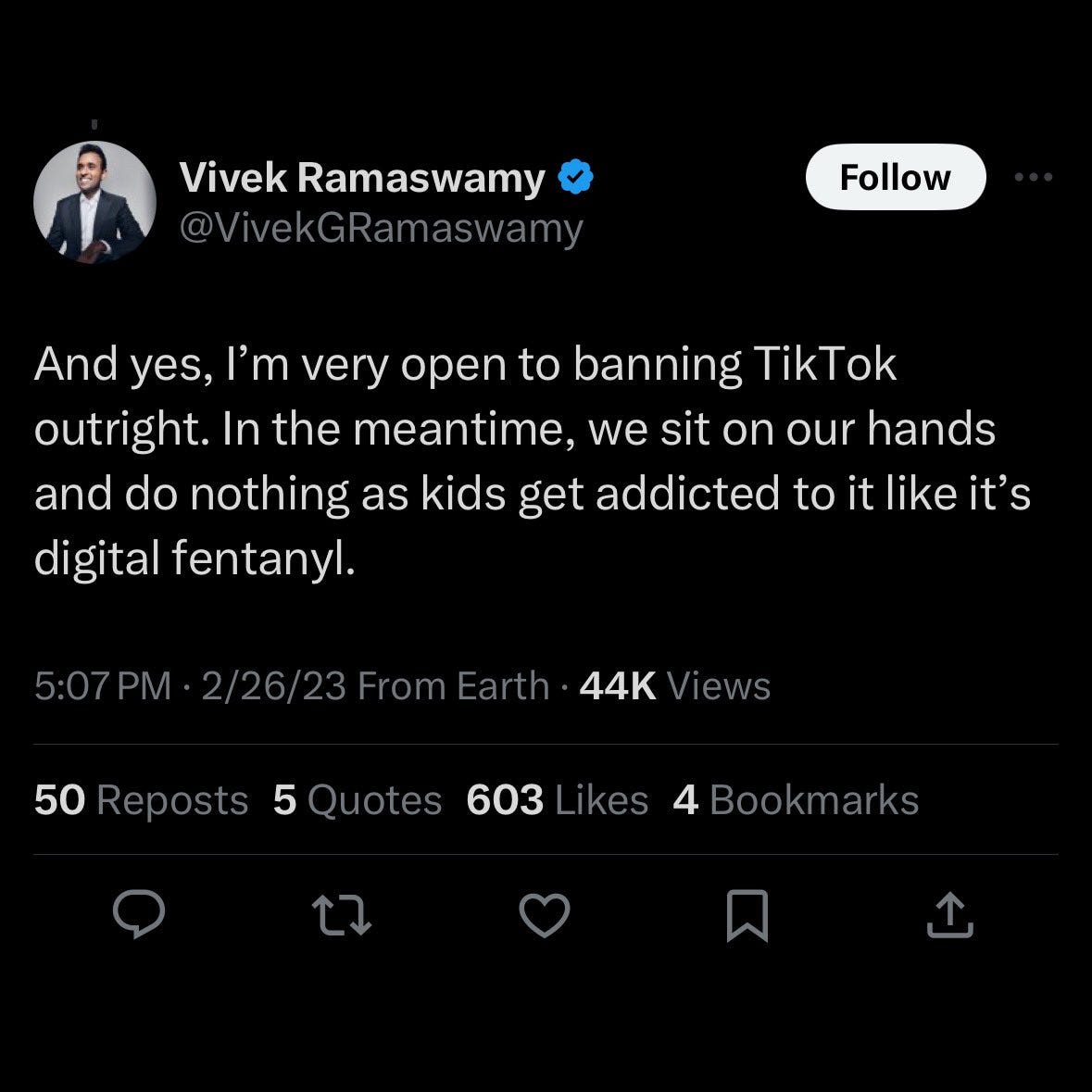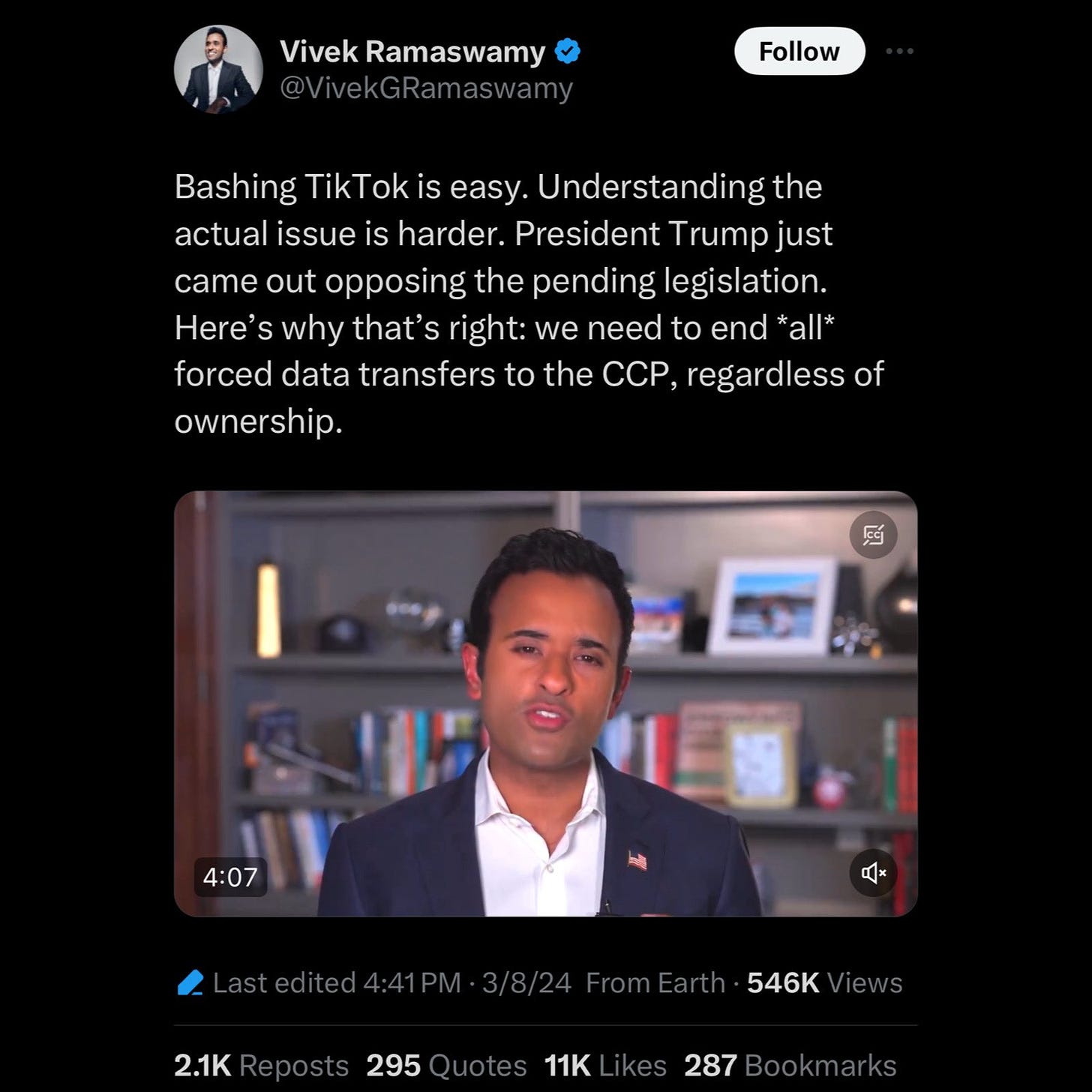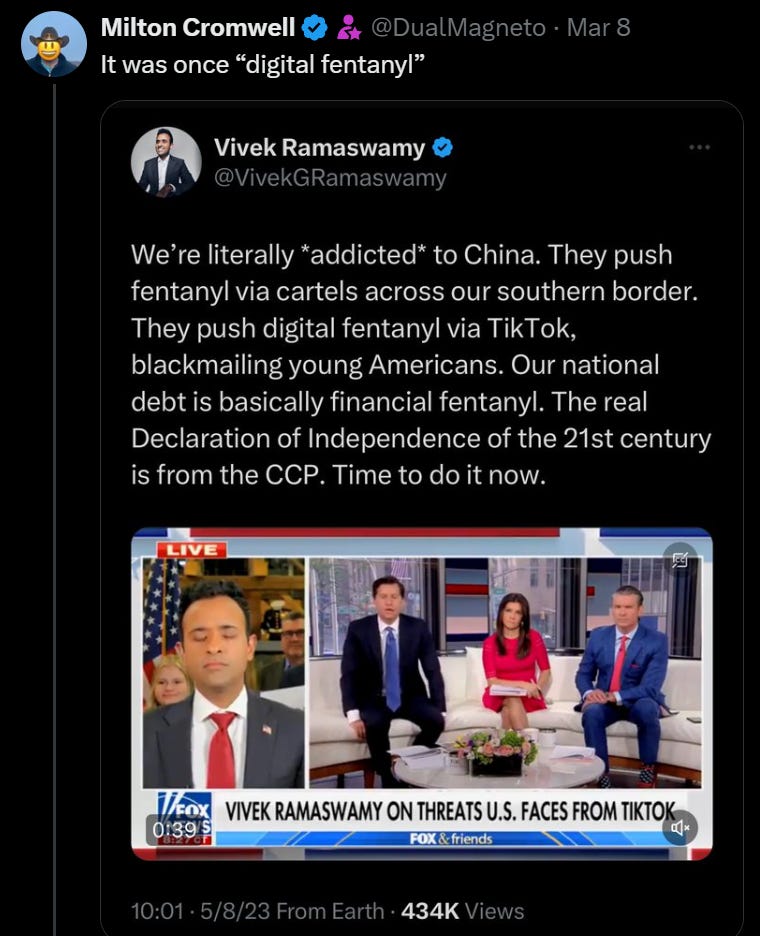This attempt is getting reasonably far rather quickly, passing the House with broad support.
Alec Stapp: TikTok bill to remove influence of CCP:
– passed unanimously out of committee
– GOP leadership says they’ll bring it to the floor for a vote next week
– Biden says he’ll sign the bill if passed
Can’t believe it’s taken this long, but should be done soon.
It’s been obvious for years that we shouldn’t let China control a black-box algorithm that influences >100 million American users.
JSM: Can this stand up to court scrutiny though?
Alec Stapp: Yes.
It then passed the house 352-65, despite opposition from Donald Trump.
Manifold is as of now around 72% that a bill will pass, similar to Metaculus. Consensus is that it is unlikely that ByteDance will divest. They will fight in court, and if they lose they likely are not bluffing about letting TikTok be shut down or banned in America, Metaculus only has a 12% chance they will sell this year.
The bill now goes on to the Senate. I see about a 43% chance it passes there within the month, and a 71% chance it will happen this year. Those numbers seem reasonable to me.
The main purpose of this post is to go over arguments for and against the bill, and also what the bill actually would and would not do.
I have long been in favor on principle of banning or forcing divestiture of TikTok. Then I saw the Restrict Act, and that was clearly a no-good, very-bad bill.
My view of the current bill, after a close reading, is that it is vastly better, and about as good as we could reasonably expect. It seems positive and I hope it passes, whether or not ByteDance folds and agrees to divest. I expect it to pass constitutional muster, although one cannot be sure.
To make them easy to find:
I go over various arguments for and against the bill, and for and against forcing divestiture of or banning TikTok in general, as well, as well as other related developments. The good argument against the bill is the libertarian concern about expansion of government powers, and what else the government might do. I do not believe it should carry the day on this bill, but I definitely get why one might think so.
I continue to strongly be in favor, in principle, of banning or forcing divestiture of TikTok, if we could do exactly that and only that, without otherwise attacking free speech and free enterprise or expanding the power of the state.
TikTok continues to be Chinese spyware. It also continues to be an increasing point of vulnerability for China to put its thumb on American culture, politics and opinion.
It continues to promote unhealthy patterns of use. Many want to quit, or know they would be better off without it, or at least would take very little money to quit despite spending tons of time on the app, but feel locked in by a combination of a Skinner box and social dynamics of everyone else being there.
All the dynamics around this round of the fight make me more confident that it is important to get this done.
So yes, if there was a clean way to get rid of it or force divestiture, great.
However, as I said a year ago in Given the Restrict Act, Don’t Ban TikTok, the proposed S 686 or the Restrict Act would have vastly expanded government powers over the internet, a cure far worse than the disease.
So for me, ultimately, it comes down to the bill. Is it a good bill, or a bad bill? More precisely, is this a bill we can live with?
Daniel Lippman (Politico): “They’re trying to use these scare tactics to have a bill that gives the government unprecedented access to remove apps from people’s phones,” Michael Beckerman, TikTok’s head of public policy for the Americas, has said. “This is targeting TikTok, but it could go beyond it in an unconstitutional way.”
Is this bill a ban on TikTok, or merely a forced divestiture? A forced divestiture can still deny quite a lot of value, you were not previously planning to sell and now buyers have you over a barrel, but they are still very different things.
TikTok has been vehiment that this is an outright ban. They both keep calling it an outright ban, including when telling their users to call Congress, and also say that they would rather shut the app down than attempt to sell it.
Thomas Massie: The so-called TikTok ban is a trojan horse.
The President will be given the power to ban WEB SITES, not just Apps.
The person breaking the new law is deemed to be the U.S. (or offshore) INTERNET HOSTING SERVICE or App Store, not the “foreign adversary.”
If you think this isn’t a Trojan horse and will only apply to TikTok and foreign-adversary social media companies, then contemplate why someone thought it was important to get a very specific exclusion for their internet based business written into the bill:
Bill: (B) EXCLUSION – The term “covered company” does not include an entity that operates a website, desktop application, mobile application, or augmented or immersive technology application whose primary purpose is to allow users to post product reviews, business reviews, or travel information and reviews.
@CommitteeOnCCP: The bill does NOT apply to all websites.
It has a very narrowly tailored definition that could only apply to social media platforms controlled by China, Russia, Iran, and North Korea that pose a national security threat.
Ian Bremmer (on Twitter): Forcing bytedance to divest tiktok has nothing to do with the first amendment. Americans will still be able to post disinformation there.
Mike Solana: house debate on tiktok now live. one thing i’m noticing: republicans in support (mike gallagher) are very focussed on the narrow restrictions — foreign adversaries only, apps with site only, content agnostic. democrats (frank pallone) are more like “yes, AND we need censorship”
For the record, the tiktok bill remains content agnostic, but pallone mentioned another bill he’s attempting to push forward next week. absolutely crazy that they’re still attempting some kind of national content moderation scam.
Marjorie Taylor Greene now opposing the TikTok divestment on grounds she was once banned from twitter, and ‘if the US cared about china they would be banning farmland’ (which we should definitely also do btw).
Preventing China from buying farmland is supremely bonkers. The concern is actively backwards. You love it when your foreign adversaries buy your farmland. Yes, please purchase physical land in our country that we could and would confiscate without incident if you start a fight.
Cato Institute’s Jennifer Huddleston looks at the constitutionality of the new bill, presumably with maximal skepticism. She points to provisions that would help the new bill pass muster, but says there are still severe first amendment concerns. Which there certainly should be.
Unlike past proposals, the bill provides an option for a sale rather than an immediate ban; however, it creates concerning conditions in that regard as well. The proposal requires the divestiture to be approved by the government, meaning that any proposed buyer would likely be open to significant regulatory scrutiny, particularly given the government’s current positioning towards acquisitions in the tech industry. But still, this distinction will likely be important in any legal challenges to the act even if, in practice, it is unlikely to be different from a true ban.
…
Under First Amendment precedents, the government will need to prove that forced divestment or otherwise banning of the app is both based on a compelling government interest and represents the least restrictive means of advancing that interest.
…
Even if the courts found the government’s interest to be compelling, they would then consider if there are less restrictive steps the government could take to resolve its national security concerns, such as the data localization steps proposed by TikTok’s Project Texas.
The Wall Street Journal’s Jacky Wong also has constitutional concerns, and an attempted state ban in Montana was struck down.
I would still be very surprised, although not utterly stunned, if the Supreme Court, which would inevitably rule on the matter, failed to uphold this law. These seem like obstacles that the government can comfortably clear.
There are also worries this is a Bill of Attainder that were raised in the House debate, I expect that also not to ultimately be an issue but it did independently occur to me.
Alexandria Ocasio-Cortez: I’m voting NO on the TikTok forced sale bill.
This bill was incredibly rushed, from committee to vote in 4 days, with little explanation.
There are serious antitrust and privacy questions here, and any national security concerns should be laid out to the public prior to a vote.
I am sympathetic to ‘rushed’ objections when bills are so long there is no time to read and understand them. This does not seem to be one of those cases. The next two grounds, antitrust and privacy, seem odd. If anything TikTok is clearly putting privacy at risk, and if this is a forced sale I do not see large antitrust concerns.
I am sympathetic to the argument on national security, I would love to make everything they know public, but I presume that they are not doing so on national security grounds. It seems like a reasonable equilibrium for there to be some votes on Congress that you lose when you don’t do that. This creates good incentives. But I am going to go ahead and believe that there are important such concerns in play.
But the bottom line is, who is right?
So yes, it’s that time.
The preamble makes it clear this bill is aimed at TikTok and ByteDance, while using the term ‘such as,’ presumably to avoid being a Bill of Attainder.
(1) PROHIBITION OF FOREIGN ADVERSARY CONTROLLED APPLICATIONS.—It shall be unlawful for an entity to distribute, maintain, or update (or enable the distribution, maintenance, or updating of) a foreign adversary-controlled application by carrying out, within the land or maritime borders of the United States, any of the following:
(A) Providing services to distribute, maintain, or update such foreign adversary-controlled application (including any source code of such application) by means of a marketplace (including an online mobile application store) through which users within the land or maritime borders of the United States may access, maintain, or update such application.
(B) Providing internet hosting services to enable the distribution, maintenance, or updating of such foreign adversary-controlled application for users within the land or maritime borders of the United States.
[this applies to anything that qualifies under [g3a] or [g3b]].
This would remove TikTok from the Apple and Google marketplaces. It is not clear how effective this would be against side loading. Note that the this language does not make it illegal to use the application, only to provide hosting services or a marketplace, if ByteDance decided to continue offering the service from abroad.
If you violate 1a that is $5,000 per user, if it is 1b then $500 per user. How much would you pay for TikTok?
Section 1.2b says that before the cutoff date such applications must provide users with all their data for portability. Good luck with that.
Section 1.2c lays out the remedy. If you do a qualified divestiture, you’re off the hook from that point on, and technically you’re allowed to provide limited services to comply with other provisions.
Section 1.2e is the severability boiler-plate in case of court challenge.
Section 1.2f clarifies that users are safe, they cannot even be fined.
Section 1.2g defines terms.
1.2g1 says that ‘controlled by a foreign adversary’ means domiciled in, headquartered in, organized under the laws of, owned at least 20% by or subject to the control of a person or entity from the adversary. I note that 20% is not so high, and ‘subject to the control’ could be ambiguous, but mostly seems fair.
1.2g2 describes what ‘covered company’ means.
(2) Covered Company.
(A) In General. The term ‘”covered company'” means an entity that operates, directly or indirectly (including through a parent company, subsidiary, or affiliate), a website, desktop application, mobile application, or augmented or immersive technology application that meets all of the following criteria:
Permits user account creation: Allows users to create an account or profile to generate, share, and view text, images, videos, real-time communications, or similar content.
Has a large user base: Has more than 1,000,000 monthly active users for at least two out of the three months preceding a relevant determination by the President under subsection (3)(B).
Enables user-generated content: Enables one or more users to generate or distribute content that can be viewed by other users of the platform.
Allows viewing of user-generated content: Enables one or more users to view content generated by other users of the platform.
(B) EXCLUSION.—The term ‘‘covered company’’ does not include an entity that operates a website, desktop application, mobile application, or augmented or immersive technology application whose primary purpose is to allow users to post product reviews, business reviews, or travel information and reviews.
So it needs to be some form of social media, of some kind: You need to have a million users, account creation and viewing and creation of user-generated content.
Would this, as some say, ‘apply to websites’? Certainly you can imagine websites that would qualify here. But most websites certainly would not qualify. This seems reasonably well drafted.
The exception also seems well-considered. Review sites would otherwise potentially qualify and are not covered. The obvious thing that would still qualify, that one might reasonably object to, would be a shopping platform, since it would not be ‘primarily’ for posting reviews but users would still create accounts and post review content? Thus, if this is intended to be narrow, I would suggest the Senate extend 1.2g2b by saying ‘where the primary purpose of its user-generated content is to allow users to…’ or other similar language.
This should cover most remaining cases where the thing in question is in not intended to be a form of social network or messaging platform. You would still hit for example a Chinese Reddit, but it seems difficult to explain why it shouldn’t.
You could also say that websites should be exempted, and we should only ban the mobile app. Under that alterative theoretical regime, you could use TikTok all you wanted, but you would have to go to their website in the browser, creating friction. I am not alarmed by the current proposal, but I would be down for that compromise, as it robustly protects free speech – if you want the content badly enough you can load up Chrome – while still being a substantial effective barrier, and it would mitigate the spyware concerns.
Section 1.2g3 defines ‘foreign adversary controlled application’ and it explicitly names ByteDance and TikTok, in addition to anything else from a covered company that is controlled by a foreign adversary and is determined by the President to present a significant threat to the national security of the United States after a 30 day determination period.
Section 1.2g4 says ‘foreign adversary country’ is specified in section 4872d2 of title 10, US code, which currently I think says China, Russia, Iran and North Korea. I am curious about Cuba and Venezuela but it matters little in practice either way.
Section 1.2g5 outlines what an internet hosting service is. A regular ISP would not be required to block websites, but managing the resolution of domain names to IP addresses could be an issue, and you couldn’t host the services.
Section 1.2g6 defines a ‘qualified divestiture,’ which would be up to the President to approve as a transfer of control that precludes any operational relationship including operation of a content recommendation algorithm with respect to data sharing. One could read this as saying you could share the algorithm as long as you did not share data.
The rest seems standard.
So what does this law do in practice? Is it a big power grab?
It lets the government shut down mobile apps, and to some extent websites, that are playing the role of social media, a messaging service or something similar , with a million or more users, while having substantial foreign involvement from our enemies list, right now mainly Russia and China, unless those apps are sold and control transferred, if the President determines the service is a danger to the national security of the United States.
Perhaps I am being naive, but this seems much better than the previous Restrict Act. It is in several ways narrowly tailored, where the Restrict Act was an open invitation on anything deemed a national security risk. This only applies to things shaped a lot like social media, the other bill referred to basically anything. The previous bill fined users of VPNs $250k or more plus criminal penalties, whereas this bill explicitly exempts users and offers only civil penalties throughout.
As a practical matter, if ByteDance were to defy the United States, what would happen under this bill? We know the app stores would comply, but beyond that? If you already had the app installed, it might be difficult to get updates, but it would be hard for America to force you to uninstall. On Android you can side load. If you used a VPN, you could do whatever you wanted. If you were willing to navigate to the website, and they were willing to keep that website available, there it would be.
I think this is fine. An outlaw TikTok would presumably rapidly lose momentum in that world, while allowing current users to wind down more gradually. Alternatively, TikTok could divest.
I am open to argument that this is more broad or worrisome than it seems, but my view right now is this is about as good as we could reasonably expect. The only better bill that wouldn’t be a Bill of Attainder, other than raising the user threshold (I would like to see 10 million ideally?) would be to accept websites, which would be a large practical compromise in terms of accomplishing the goal.
So yes. I can support this bill as written.
Nate Silver points us to Pew Research Center, which found it was very popular in March of 2023, and still popular in October 2023 but less so especially among Democrats.
One strong argument for banning TikTok is reciprocity.
China has the Great Firewall. It completely bans Facebook, Twitter, YouTube, Instagram. You can’t even access American TikTok.
They instead force their users onto China’s own platforms like WeChat., Sina Weibo and Douyin (the Chinese version of TikTok).
It seems quite reasonable to say that if China wants us to allow TikTok, they need to allow American social media in China. Why should we let them get away with this kind of blatantly anti-competitive action?
Some people don’t know this, and run into razor blades.
There is an obvious economics counterargument that imposing retaliatory tariffs or import bans only hurts you. That is true by default but rests on three assumptions.
-
It assumes your choice does not impact the choices of others, including in the past and future. If your unwillingness or anticipated unwillingness (or inability) to retaliate means everyone throws up one-way barriers, that could be bad for them but it is certainly bad for you.
-
It assumes goods are broadly normal and competitive, like most physical goods. If there are strong network effects that generate winner-take-all scenarios and essentially zero marginal costs, these considerations clearly break.
-
There is the terms of trade argument and other related considerations. It seems hard to deny that banning TikTok would improve our terms of trade with China, unless China decided to massively retaliate, despite again having banned all analogous services in the other direction.
These considerations are on top of all other considerations in both directions. I would not consider them decisive on their own if there were no other concerns, but I believe they add substantial weight.
Also some noted that TikTok is trying to challenge Amazon, and trying to launch TikTok Shop as a shopping destination, currently selling on the order of $7 million a day. Amazon has limited presence in China. It is not outright banned, but no doubt China would not allow it to gain the kind of key role that it has in America, or even a fraction of that. Also no one is saying ByteDance can’t have an e-commerce business?
I don’t buy that the intention was ever to seriously challenge Amazon. I believe the idea was a much smarter one, which is to use the link to TikTok to provide a way for creators to earn money while driving sales. So you advertise a product in your video, if someone clicks through you get a cut, everyone wins, great, good idea, YouTube and Instagram and Twitter should be working on doing more of this as well. But to then try to leverage that to challenging Amazon? Well, good luck, I guess. Remember that for all its value and cultural leverage, TikTok is not yet profitable.
TikTok responded to accusations it was exercising undue influence over its users and our democracy on behalf of China and getting them addicted in unhealthy ways and trapped in bad equilibria where they cannot quit by directing its users to call into their congressman’s office and explain this was a ‘ban on TikTok’ and how much they relied on and spent infinite time on TikTok.
Mike Solana: tiktok just blasted this to 150 million americans. a blatant lie. odd the trust and safety team wouldn’t catch this one.
Is this a ban on TikTok? Technically no. It could mean TikTok goes away, if ByteDance responds to it by refusing to sell and letting the whole thing burn. But also ByteDance could threaten to shut TikTok down if America continues selling chocolate ice cream, or if we don’t elect the right candidate. Decisions.
Of course, plenty of advocates are calling it a ban, so you can’t be that mad at the spin.
Anyway, at this point the calls flooded in, some to explain how desperately people needed TikTok, some because they would click whatever button the app told them to?
“It’s so so bad. Our phones have not stopped ringing. They’re teenagers and old people saying they spend their whole day on the app and we can’t take it away,” one House GOP staffer told POLITICO, granted anonymity to speak candidly.
“If you ban TikTok, I will kill myself,” said one caller, according to audio obtained from a House GOP office. The caller had noted seeing TikTok’s pop-up that claimed members are trying to shut down the app.
Another House GOP staffer observed that “most of the callers are unaware of why they’re even calling, with several agreeing with the bill but calling to continue using the app.” That staffer predicted their office would “easily surpass” receiving “1,000 calls today.”
A third House GOP staffer said some of the younger callers were using false and sometimes vulgar names, such as “Mr. Ben Dover.”
…
Rep. Mike Gallagher (R-Wisc.), cosponsor of the TikTok bill, said the video app’s pop-up alert is lying about his bill. “If you actually read the bill, it’s not a ban. It’s a divestiture.”
Byrne Hobart: An app whose parent company has explicitly promised to prioritize the interests of the CCP is mobilizing users to change the outcome of the legislative process.
Neat.
Alec Stapp: “The Chinese Communist Party can send push notifications to 170 million Americans from their favorite app” really should be the end of the debate
Ryan Guill: I dont know that I had a well formed opinion before, but yeah, this should settle it
Eliezer Yudkowsky: Some social media company finally went and added easy phone calls to Congress. Personally, I was a little “how noneliezeran!” that Google didn’t do this way earlier, or Uber under Travis. But I can see how this would be too scary in the USA, such that China did it first.
Emmett Shear: OTOH it seems like it’s backfiring, so maybe the US companies know better than to poke the bear.
Eliezer Yudkowsky: They’re not doing it the way I’d have done it at Google, that’s for sure.
Patrick McKenzie: Didn’t Uber actually make in-app CTAs for city-by-city political activism? Best citation I could find, but I felt contemporaneously that this was part of the playbook.
Eliezer Yudkowsky: Huh! Well, chalk one up for my brain’s correct sense that this seemed like something Travis ought to have tried, given who he otherwise was.
When you put it that way, perhaps it was not the smartest move?
It has been known for some time that a voter calling their congressperson’s office, or writing a letter to their congressperson, has an oversized impact. Almost no one does it, and it is not something anyone has been able to astroturf effectively. So being willing to risk mild social awkwardness or actually write a physical letter, or even a personalized email, is a strong signal, if you are indeed a local voter.
At some point, it was inevitable that a tech company was going to weaponize this. Uber did that somewhat when officials noticed that it was at the time technically a completely illegal operation, to turn it into a legal one, by pointing out that life was a lot better if you could hail an Uber. That essentially worked.
This instead predictably backfired. It misrepresented the bill. It drove home to everyone exactly what they were up against, and why they needed to take action, and also in a very practical sense made their lives worse, scared them and pissed them off. How would you react in this spot?
Congress reacted by having the TikTok bill, H.R. 7521, pass 50-0 out of the Committee on Energy and Commerce.
In the past, everyone agrees TikTok had a data sharing problem, where its user information was given to and used by ByteDance. This seemingly included a bunch of data that TikTok should not by the terms of the Apple and Google stores, or by any reasonable interpretation of national security, be allowed to collect, such as customer exact location data, which it has used to track journalists criticizing the company (although, I mean, if you are that journalist, how did you not know to delete the app, You Had One Job).
Katherine Dee: What data could the CCP weaponize from TikTok, and how would they do it?
Park MacDougald: Beijing-based employees of ByteDance have used data from TikTok—which TikTok says they are unable to access—to track the movements of U.S. journalists reporting on TikTok in order to hunt for their sources within the company.
Forbes: We stress that it was Baker-White, specifically, who broke all these stories, because Baker-White reported in 2022 that China-based Byte Dance employees had used Tik Tok to spy on her and other U.S.-based journalists covering the company. ByteDance employees in Beijing improperly gained access to the U.S. journalists’ IP addresses and user data, tracking their locations to see who they were meeting with in an effort to identify their sources within the company.
When the story first broke, Byte Dance and Tik Tok not only denied that the spying had taken place but also claimed that it was technically impossible for Byte Dance employees to monitor U.S. users due to TikTok’s data security provisions.
ByteDance later admitted that it had spied on journalists through Tik Tok in exactly the way the article had reported, but blamed the spying on rogue employees. Those same “rogue employees,” who led Byte Dance’s internal audit team, had also spied on the TikTok executive responsible for limiting Chinese access to U.S. user data. He left the company in 2022.
Andrew Rettek: Banning TikTok because you think the algorithm is malicious is, charitably, a stretch on 1st amendment grounds. This is bad behavior that isn’t covered by the Bill of Rights.
It also includes the usual stuff like emails, birth dates, IP addresses and so on.
Then TikTok claimed it would silo all the American user data, which has been code named Project Texas (which, contrary to some claims, was developed by ByteDance during the Biden administration). ByteDance says it has successfully walled the data off. The Wall Street Journal report on this is highly skeptical, saying that data sharing often still happens without ‘going through proper channels,’ and the hardware used by the American division is potentially insecure, and the Chinese division changes the algorithm constantly in ways the American division does not have the resources to understand.
With Project Texas, “I’m skeptical that TikTok’s efforts here ever had any value,” said Jacob Helberg, a member of the U.S.-China Economic and Security Review Commission, a congressional research and advisory panel, who has organized a bipartisan, bicoastal alliance of China hawks.
…
TikTok executives have said internally that they sometimes need to share protected U.S. data with ByteDance to help train the algorithm, or with employees outside Project Texas who work on keeping problematic content off TikTok, according to people familiar with the unit.
…
TikTok has said Texas-based Oracle—the inspiration for the unit’s name—is monitoring all the data that leaves Project Texas and is also checking every line of code in the app’s algorithm for suspicious changes.
But Oracle doesn’t monitor the data employees share with each other over TikTok’s internal messaging tools, according to people familiar with the data-sharing.
…
Project Texas started to informally roll back some of the data-sharing rules last spring. Managers told employees that they actually could save data to their computers, and that there would be exceptions to the requirement that they could only share data in aggregate.
Now many of the Project Texas data protections have devolved into what one employee called “a wink and a nod.”
…
One Project Texas executive recently told employees that TikTok workers outside of Project Texas are tired of hearing “no” when they ask for U.S. user data.
I doubt there is actual zero value in this. Frictions like this increase the practical costs of interference. Friction matters. They also create more attack surface and blameworthiness for the future. What they certainly should not do is give us confidence that users are being protected the way ByteDance claims they are.
There is also the fact that this recent bill moved forward right after a closed door meeting on Chinese espionage efforts. I have no idea what was said, but the timing has clear implications.
Michael Tracy (Newsweek): Drafters of the bill are said to have received “technical assistance” from the White House; President Biden swiftly pledged to sign it. Among the factors that are said to have spurred this latest outburst of legislative activity was a secret briefing last week by the FBI, the Department of Justice, and the Director of National Intelligence (ODNI). “Because it was a classified hearing, I cannot discuss the details,” explained Rep. Morgan Griffith (R-VA), a member of the House Energy and Commerce Committee, which sprung into action after receiving the secret “Intelligence Community” presentation.
You can read this as ‘deep state helps write bill’ and you can also read this as ‘private information from deep state was convincing to congress that this bill was needed.’ Is this, as Tracy suggests, a ‘power grab by the deep state?’ It seems like everyone involved is doing normal everyone involved things, and it is a power grab to the extent that the law grants additional government authority, see the relevant section where I examine the bill.
Also via community notes we have this from June 21, 2023, that after ByteDance said under oath to Congress that Americans data has always been stored outside China, that this (at least at that time) continued not to be the case, and that ByteDance was forced to admit this.
There is little doubt that China has total leverage over ByteDance if and when it wants to exercise that leverage. When the CCP cares about something, it happens, apology letters get issued, and woe to anyone who stands in their way.
Here is a rather dramatic illustration:
Hu Xijin: I support #TikTok’s tough response. Either it is ByteDance’s TikTok, or the US government might as well shut it down — but ask the 170 million TikTok users in the US first: do they agree?
CommitteOnCCP: BREAKING: Chinese Communist Party propagandist and former editor-in-chief of state media says: “Either it is ByteDance’s TikTok, or the US government might as well shut it down.” Why is the CCP so scared over losing control of TikTok?
Brad Hargreaves: The fact that ByteDance would shut down TikTok rather than earn (at least) tens of billions of dollars from a sale gives up the game here.
ByteDance is not a normal tech company driven by profit motives. It’s a tool of a hostile foreign power.
It’s gotta go.
Heterodox Progressivism: It would be hundreds of billions of dollars. My guess is there’s no way for them to truly divest the asset and hand over servers and code without handing over evidence of the manipulation and data theft that’s been going on.
Brad Hargreaves: I think that’s right on both counts.
Noah Smith: The fact that both TikTok’s current ownership and prominent CCP propagandists are absolutely DESPERATE to stop a forced sale of TikTok shows that they view it as an indispensable propaganda tool.
Jimmy Quinn: This needs to be pointed out more: ByteDance is part of the CCP’s military-civil fusion system. It’s possibly the most compelling reason to crack down on ByteDance/ TikTok.
“ByteDance is not just a tech company; it is a cog in China’s vast military machinery.”
Also, I mean, this is hella suspicious, don’t you think?
Current and former TikTok employees who criticize the company risk losing any stock they own—in some cases worth millions of dollars—under a shareholder agreement that bans disparaging the social media service…Five attorneys who practice shareholder law told Fortune that TikTok’s non-disparagement provision is unusual, but not illegal…
TikTok’s shareholder contract, viewed by Fortune, says shareholders cannot “directly or indirectly make any critical, adverse or disparaging statement or comment about the Company or any of the Company’s subsidiaries, affiliates, directors, officers, or employees.” If shareholders are caught doing so, “all of the participant’s restricted share units will be immediately forfeited.”
TikTok claims that in terms of presenting content they will ever and always be neutral. Even if that is their preference, they are lying, because the decision is not ultimately up to them. Regardless of how many orders have or have not yet come down from the CPP, ByteDance’s claims that they would never do as the CCP orders are not credible.
How much and how they use that power is difficult to know. TikTok is highly specialized, so it is hard to rely on anecdotes if we want to describe its general behavior.
Matthew Yglesias: YMMV but I put “Uyghur genocide” into the TikTok search bar just now and three of the top four videos that came up were saying anti-Uyghur repression is a big myth that needs to be debunked.
Jostein: TikTok suggested “Uyghur genocide” when I entered the letters uyg. The top 4 results were critical of the Chinese government or discussed suppression of speech. TikTok is successful because its algorithm works. It knows I would have scrolled past any CCP propaganda.
Timothy Lee (distinct thread): People who say “what’s the big deal, I almost never see political content in my TikTok feed” should think harder about how propaganda works.
For example, TikTok could help a candidate by suppressing negative videos about that candidate and positive videos against her opponent. That could move public opinion while making the platform seem “less political.”
One can of course create a fresh account and do this and other similar things. The answers are knowable, if one wishes. Even then, how do you distinguish what users of TikTok choose within this setting from interference in the algorithm, including ‘correct it if it goes one way, let it ride if it goes the other’ style considerations?
So for the obvious first example that reignited calls for the ban, it is known that TikTok is heavily anti-Israel, very differently from other platforms and from the American public. Yes, those who are most vocal tend to be anti-Israel, but this is ridiculous:
In Time, Anthony Goldbloom offers this, 17.3% is both a ton and would not suggest an 80:1 ratio should happen by accident.
Perhaps that is a natural outcome of who is on the platform doing what, and the nature of its videos, and due to snowball effects where everyone is scared to express a dissenting point of view on the platform or chooses to leave it? Again, somewhat, but the extent seems highly implausible.
Nate Silver: TikTok’s users are young, and young people are comparatively more sympathetic to Palestine than older ones — but not by the roughly 80:1 ratio that you see in the hashtag distribution. I would not treat this data as dispositive — expression on social media can be contagious and overstate the degree of consensus. But this matches a pattern in other TikTok content that is sensitive to China, such as tags critiquing its policy toward Hong Kong.
Then we extend this to more of the obvious, from this study.
As opposed to, say:
Noath Smith presents the information this way, from NCRI:
Timothy Lee: A study last year found that topics that aligned with the interests of the Chinese government receive wildly disproportionate attention on TikTok, while topics Beijing considers sensitive tend not to go viral on the platform.
Yes, these could in theory each be a coincidence, or the result of dynamics from the user base and video stylings and natural algorithmic dynamics, with anti-China people not using TikTok.
But also, come on.
If all of this was one big coincidence and the result of cherry-picking, then it would be easy to point to other examples that point in the opposite direction as counterarguments. I have never seen anyone cite a convincing counterexample, or any that I could recall.
After this study was published, ByteDance reduced data transparency.
Oh also this from Noah Smith:
Noah Smith: This is very damning evidence indeed. And even if you’re skeptical of circumstantial evidence like this, there are leaked documents that prove the company has done exactly the kind of censoring that the study found:
TikTok, the popular Chinese-owned social network, instructs its moderators to censor videos that mention Tiananmen Square, Tibetan independence, or the banned religious group Falun Gong, according to leaked documents detailing the site’s moderation guidelines.
If this isn’t a smoking gun, there’s no such thing as a smoking gun.
Armand Domalewski: I did not know leaked documents from TikTok revealed it had instructed its moderators to censor videos that mentioned topics the Chinese government wanted suppressed
And yes, I think this matters, and keep in mind one should expect such trendlines to continue:
Katie Britt said in her State of the Union response (obviously without stating her evidence) that TikTok was ‘poisoning the minds” of a generation of children.
Even if there were no smoking guns, this does not seem like a situation in which one should need one in order to proceed?
Matthew Yglesias: Here’s the analogy I like to use. It’s 1975 and a state-owned Soviet firm wants to buy CBS. What happens? Well, what happens is they wouldn’t be allowed to. The FCC would block it. The Committee on Foreign Investment in the US or its predecessors would block it. If they didn’t have the power, congress would write a new law. And even if it wasn’t CBS, if it was a chain of local TV affiliate stations, the outcome would be the same. There would be no detailed factual analysis or demand for gold standard evidence that a Soviet-owned television statement might do Moscow’s bidding or that television is capable of influencing public opinion. We’d reject the idea out of hand. And rightly so, because the downsides would be very clear, and the upside minimal.
That’s how the TikTok situation looks to me.
Alec Stapp: This is not unprecedented. In fact, it’s standard national security policy for politically sensitive media & communications networks.
We would never have allowed the Soviet Union to own CBS/NBC/ABC during the Cold War.
But we let the Chinese Communist Party control the black box algorithm for the most popular social media app in our country.
Justin Wolfers: “We must ensure the Chinese government cannot weaponize TikTok against American users and our government through data collection and propaganda.” …because that’s a job we only trust Elon Musk and Mark Zuckerberg with.
Nate Silver: It is fine to be inherently more distrustful of platforms run by countries officially designated by the United States government as foreign adversary countries.
Robin Hanson: Because we all trust the US government so much?
I would say to Robin Hanson and Justin Wolfers, fully trust absolutely not, obviously that would be crazy, and we have to be careful about exactly what powers we entrust USG and also the others with as well, but yes I trust USG or Musk or Zuckerberg to look out for Americans a lot more than CCP.
Matthew Yglesias also reminds us extensively that China systematically uses all the economic levers at its disposal to silence foreigners on the issues it most cares about, strongarming companies like Disney, Apple and Mercedes-Benz. It seems crazy to think that they will not their leverage over TikTok in at least similar fashion.
His response struck me as remarkably similar to his position against taking government action on AI. Claim that the problem has not been sufficiently modeled, that one must point to specific concrete harms. Point out that existing laws exist. Warn of a ‘rush to judgment’ as the years pass and the problems intensify.
Tyler Cowen: I’ve blogged this in the past, and don’t have much to add to my previous views. I will say this, however: if TikTok truly is breaking laws on a major scale, let us start a legal case with fact-finding and an adversarial process. Surely such a path would uncover the wrongdoing under consideration, or at least strongly hint at it. Alternately, how about some research, such as say RCTs, showing the extreme reach and harmful influence of TikTok? Is that asking for too much?
Now maybe all that has been done and I am just not aware of it. Alternatively, perhaps this is another of those bipartisan rushes to judgment that we are likely to regret in the longer run. In which case this would be filed under “too important to be left to legal fact-finding and science,” a class of issues which is sadly already too large.
Looking over his previous statements, I see two basic themes.
One, continued demands that we ‘prove’ that China or ByteDance has its finger on the scale. I say that the information elsewhere in this post, in the absence of counterexamples, is very strong evidence. At minimum, they are fixing content balance issues they dislike and allowing those they like, with an algorithm that snowballs. More likely, they are doing exactly what it looks like they are doing. This is not a criminal conviction, we do not need to know beyond a reasonable doubt.
As Noah Smith says, we see some guns. They are smoking.
I do think it would be good to have more data and better studies, regardless of what is decided by Congress.
Two, pointing out that the Restrict Act was a terrible bill. Here, I strongly agree. We cannot trust the authority we are counting on to ban TikTok to stay its hand when it should stay its hand, so we need to be careful of the contents of the bill we pass.
I would be open to arguments that this bill is similarly bad, if that were the case. I however notice Tyler is not making comment on the contents of this particular bill.
I also find his lack of concern interesting in the context of what is otherwise strong nationalism, and concern about Chinese competition, especially technological competition.
Donald Trump met with billionaire investor and Club for Growth donor Jeff Yass, who holds a 15% stake in ByteDance. Shortly after, Trump started opposing the ban, despite having previously actually issued an order requiring divestiture back in August 2020, which Biden reversed while it was stalled under legal challenges.
In some sense the least surprising story of all time is ‘politician shifts position to reflect that of their biggest donors,’ especially when the politician is Donald Trump.
Matthew Yglesias: Trump sold out what’s supposed to be one of his signature causes for the promise of some campaign contributions, a play that authoritarian states will be able to run over and over again as long as he’s in charge.
In this case, with how much emphasis he puts on being tough on China and interfering with international trade even when it makes zero economic sense, and how the ban has such broad political support and majority popular support, and there presumably going to be enough money on all sides for 2024 to essentially make the rubble bounce, although Noah Smith says instead that Trump’s campaigns are currently hurting for funds in addition to his legal bills?
Noah Smith reasonably calls this Trump move a ‘rug pull’ of China hawks. Josh Rogin in The Washington Post says this ‘suggests’ his China policy is for sale.
So if this doesn’t involve outright bribes or a deal to use TikTok to his advantage?
Then actually yeah, it would be kind of weird.
Matthew Yglesias: On March 1, Trump got a bunch of money from formerly critical GOP mega-donor Jeff Yass, an investor in ByteDance.
Less than a week later, he is now suddenly in favor of continued Chinese ownership of TikTok.
I know a lot of relatively serious-minded conservatives think it’s worth downplaying Trump’s corruption and other personal flaws for the sake of larger policy aims, but the whole deal with him being corrupt is those aims can always change after a check.
Mike Solana: If a billionaire TikTok investor pivoted from ‘never Joe Biden’ to ‘geezers only 2024’ and then, following a meeting with that billionaire TikTok investor Biden reversed his years-long position on TikTok and publicly defended the company you would absolutely LOSE YOUR MINDS.
Tim Miller (MSNBC): Looks like Mike Solana deleted this attack on Trump for flip flopping on TikTok after meeting with a top investor.
Mike Solana: MSNBC analysts following me closer than my mom
Bearded Miguel: Also the tweet he quoted is correct.
Mike Solana: Well of course.
Noah Smith: It was a good burn btw.
It seems Trump is not actually expending effort and lobbying to kill the bill. Which makes sense. That would be highly out of character.
This is perhaps not entirely out of left field, Kellyanne Conway has apparently been defending TikTok for weeks with terrible arguments? And others in his orbit have been making similar moves as well.
Shoshana Weissmann: I’ve heard about these meetings from others over the past weeks. The worst part is the arguments they’re making in meetings have nothing to do with either free speech or national security. It’s extremely shallow, vapid stuff on a serious matter.
Daniel Lippman (Politico) on March 9: Kellyanne Conway, the former senior Trump aide, is being paid by the conservative Club for Growth to advocate for TikTok in Congress and has had at least 10 meetings with lawmakers in recent months about the app, according to three people familiar with the meetings.
Some Trump allies, including former presidential candidate Vivek Ramaswamy, have recently become more amenable to the app. Tucker Carlson joined late last summer. Elon Musk, who recently met with Trump, on Friday publicly agreed with his recent post in defense of TikTok.
Matthew Yglesias: To be fair, she’s just following what’s now the true MAGA line.
It’s the anti-TikTok folks who are RINOs now.
Most others only changed their minds in response to Trump. For example, here is Vivek Ramaswamy (who also got millions from Jeff Yass) on February 26.
And here he is on March 8.
And of course here’s Vivek back on 5/8/23:
Here’s a clip of him explaining his position and accusing ‘professional politicians’ of flip-flopping in this context, which is some grade-A chutzpah.
That seems like a deeply silly argument. If you want something even broader, then propose something even broader. I don’t even know what ‘ban all data transfers’ would mean in practice if it wasn’t a ban on Chinese companies doing business at all, and neither does Vivek. Nor is he making a case that this bill is negative on the margin, which is the question that matters.
For example, here is Senator Tom Cotton saying “sitting down with TikTok’s CEO is ‘no better than meeting with Hamas or the Taliban.”
Which is technically true. Meeting people you disagree with, even terrorists you disagree with, is not bad. The ‘you cannot meet with the baddies’ thing is dumb. But this is not the perspective of Tom Cotton, and his intended implication is clear.
I see the case for forcing divestiture of TikTok as overdetermined. It is functionally Chinese spyware, with a history of lying about it and doing things like tracking journalists. China does the same to similar American companies. China seems to very clearly be using its influence to move public opinion, and has now put out 150 million push notifications to call Congress on its behalf, and one has to wonder what deal was made with known dealmaker Donald Trump.
The status quo is not something we can tolerate under these circumstances.
I also think that TikTok’s core product poses a serious problem even in the absence of all that, that we would be better off without it, and that one would be wise to personally avoid using it. But many are addicted, or feel trapped by social issues. I would not act on this alone, but it is a contributing factor.
As always, the concern is in the details of the bill. Last time, the Restrict Act, was a vast overreach that I am very happy did not become law. This time, it appears the law was much more narrowly constructed, applying only to providers not users, without any criminal penalties or any insane civil penalties. What services are impacted seems far more limited as well.
Is it perfect? No, the actual bills never are. But based on my reading of it, this is a bill I can support.
